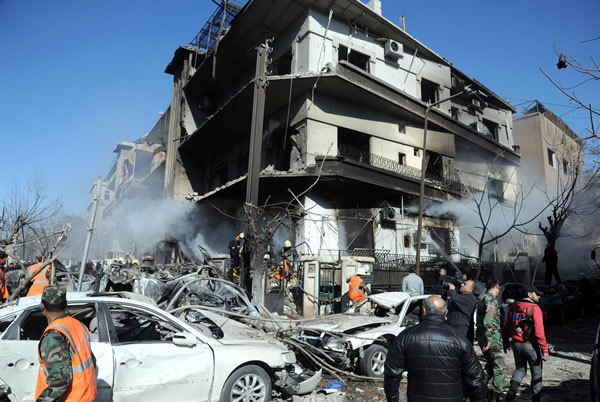
A handout picture released by the official Syrian Arab News Agency (SANA) on March 17, 2012, shows fire fighters at the scene following a two bomb attacks on security buildings in the heart of the Syrian capital Damascus which killed several people, state television said. (Photo: AFP PHOTO/HO)
Last week, a House Foreign Affairs subcommittee held a hearing provocatively titled “Is Al-Qaeda Winning?” The answers that the Subcommittee on Terrorism, Nonproliferation and Trade received were profoundly unsettling.
Former Senator Joseph Lieberman (I–Conn.) testified that Syria had become a key focal point of al-Qaeda’s efforts. He noted that there are more foreign militants fighting in Syria today than in Iraq and Afghanistan combined over the past 10 years: “Put very bluntly, Syria has become the most dangerous terrorist sanctuary in the world today—and the United States has not coherent or credible policy for dealing with it.”
>>> Read More: The Arab Spring Descends into Islamist Winter: Implications for U.S. Policy
Frederick Kagan, director of the critical threats project at the American Enterprise Institute, warned that the Obama Administration has underestimated the threat posed by al-Qaeda’s ideology, which has inspired a global insurgency. He assessed that al-Qaeda’s “brand is spreading like wildfire, the groups affiliating themselves with it control more fighters, land and wealth than they ever have, and they are opening up new fronts.”
Heritage Foundation analysts long have warned about the more permissive environment that al-Qaeda and other Islamist extremist groups have exploited in many countries destabilized by the “Arab Spring” uprisings. Syria, in particular, has been a magnet for foreign militants and a rich recruiting ground for al-Qaeda.
>>> Read More: A Counterterrorism Strategy for the “Next Wave”
Al-Qaeda has made a comeback in Iraq, and gained followers in Egypt, Libya, Mali, East Africa, and Yemen
The chief takeaway from the hearing was that the Obama Administration needs to focus more on the revolutionary threat posed by al-Qaeda and its affiliates in the Middle East and Africa. Furthermore, the administration should alter its narrow definition of the al-Qaeda threat, which it currently holds as the immediate terrorist threat posed by the al-Qaeda core group based in Pakistan.
Related:
Al-Qaeda Seeks American Recruits in Syria
Al-Qaeda Resurges in Iraq
These Words from Obama Are Frightening—and Revealing





























